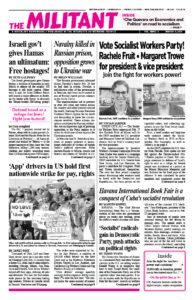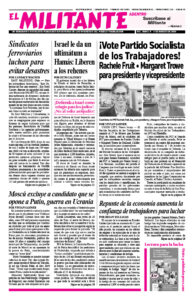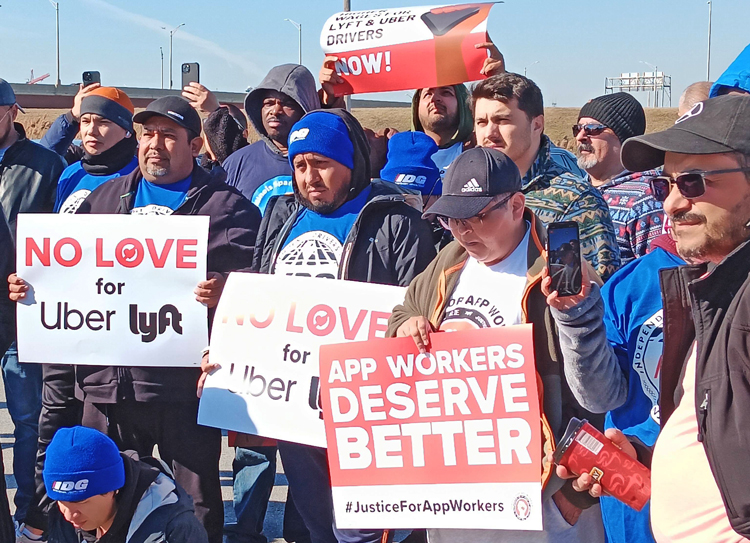Thousands of Uber, Lyft and DoorDash drivers went on a one-day strike on Valentine’s Day, Feb. 14, in more than a dozen U.S. cities, and at some airports, including Chicago, Miami, San Francisco and Newark, New Jersey. Workers turned off their apps, refusing all jobs and deliveries This was the first nationwide protest by the electronic-hailing app workers. Drivers in Canada struck in Toronto, Vancouver and Winnipeg.
The strikes were organized by Justice for App Workers, a coalition of 130,000 e-hail drivers on the East Coast and in the Midwest; Rideshare Drivers United in Los Angeles; and California Gig Workers Union and Gig Workers Rising in California.
Uber drivers’ average monthly earnings before expenses fell by more than 17% over the last year. “We cannot make the same amount of money we used to make, even if we work double the hours,” Uber driver Nupur Chowdhury said at the protest in Washington, D.C.
Drivers say the app companies are taking an increasing cut of the fares, and when they complain they face deactivations, where they lose access to jobs. Since they are designated “independent contractors,” not employees, they’re responsible for their own car, gas, tolls, insurance and maintenance.
Socialist Workers Party member Lisa Rottach reported to the Militant that 60 rideshare drivers and supporters rallied at O’Hare International Airport in Chicago. “We do all the work and they get rich,” Uber driver Eloy Cerecero told her. “Uber claims they pay 75% of the fare to the driver and then take the remaining 25%. It’s the exact opposite. We only get 25%.”
“I’m a five-star driver,” Lyft worker Tracy Nicholson told Rottach about his rating. “But all it takes is for one passenger to give me a bad review and Lyft can shut me down. There is no human being to talk with at the company to argue my side.” Nicholson said he had come to the airport to work, but when he saw the protest he decided to join the rally.
“Today is a first step, but it definitely needs to get bigger. Solidarity is the way,” he said. “Next time this should happen at rush hour.”
Since the drivers are responsible for their car and all expenses, all the app bosses do is connect the drivers with customers. For this they take out a commission on every fare. Unlike taxicab drivers, app-based drivers are not allowed to pick up passengers who hail them without going through the app.
In 2022 the companies shifted to upfront pricing for customers and drivers. Instead of paying drivers for duration and distance of the rides, the bosses charge a flat rate that isn’t subject to adjustment. Drivers take the hit if there’s heavy traffic or other delays on the trip.
Uber driver Mohamed Algaheim told the San Francisco Examiner that he makes about $15 an hour. “It’s getting out of hand,” he said.
Uber’s income was up 41% in 2023 and its operating profit rose 50%, to nearly $5 billion. The company’s stock price has more than doubled over the last year and was up 12% on the day of the strike. “We make the company’s money,” Algaheim said. “Without drivers, there is no stock.”
In the United Kingdom, app-based food delivery couriers for Deliveroo, Uber Eats, Just Eat and Stuart walked out Feb. 14 as well. One food courier and organizer for Delivery Job UK told the Guardian that she works from 7 a.m. to 9 p.m., six days a week. “The only way to make more money is to ride faster, which means taking more risks.”


